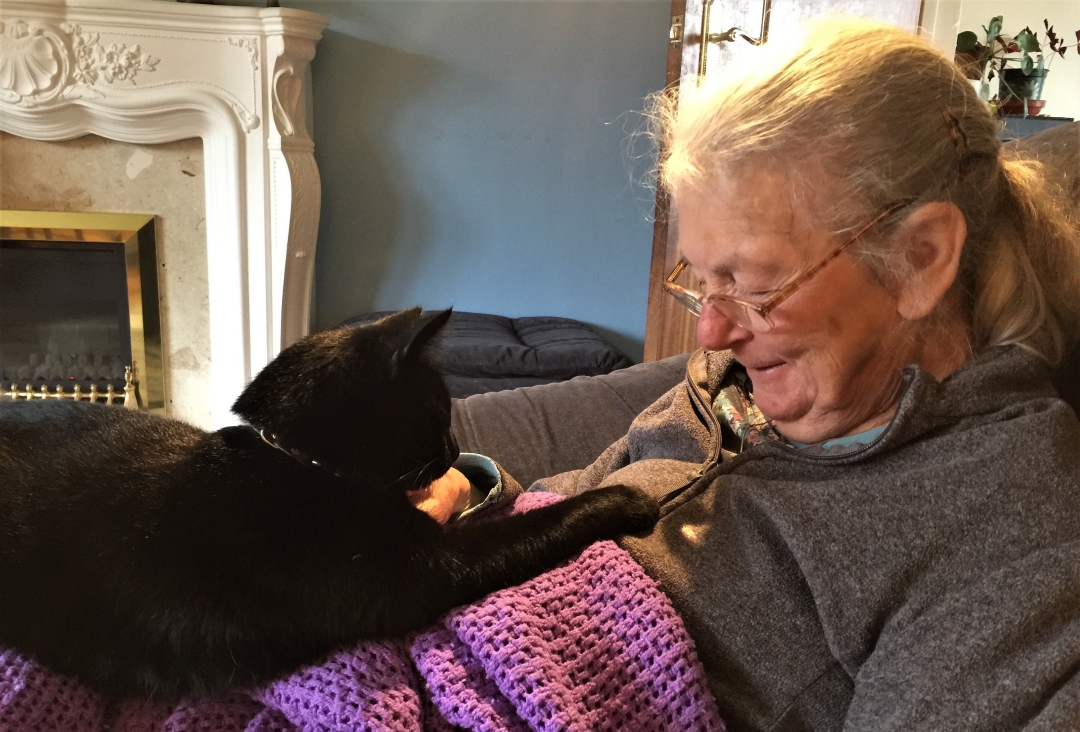One morning recently, I overheard mum saying to the carer, “I should be able to get washed and dressed myself,” before bursting into tears. The carer was sensitive and supportive, and mum was soon dressed and ready for the day. But, sitting in the living room a little later, she was still feeling fragile and despondent.
Fortunately, Mo the cat was in the living room waiting for mum and the treats she gives him. Mo, who arrived unannounced one day via an old cat flap, has been a blessing. He used to visit before mum came home, but I didn’t feed him. However, when I knew that mum would be returning, I started giving him a few cat biscuits now and then. I now count out 10 of the tiny treats for mum to give to the cat, one at a time. We do this after breakfast and supper so as not to interfere too much with Mo’s appetite (as his owner might not like it).
Stroking and scolding the cat soothes mum
The cat impatiently tries to get all the biscuits out of mum’s hand straight away, and mum has to assert her authority. Mo is quite boisterous generally, sticking her claws in, taking a swipe occasionally, and trying to bite the buttons off mum’s cardigans. Feeding the cat and telling him off gives mum a sense of control and of being in charge, which is good for her self-esteem.
Mum pretends to be cross with the cat and often tells him he’s a nuisance. The cat likes to sleep in the living room, preferably on mum’s lap. While making out the cat is a bother, she strokes him and rearranges her position to make her lap more inviting. She tells him, “You are a sweetheart.” She was concerned recently when he seemed poorly.
Mum loves animals. On a walk, we recently found ourselves in a field of horses. Initially mum was keen to stroke one of them, but we both became a bit nervous when the four horses started to close in on us (see below). We made a speedy get away. She loves feeding the ducks whenever we go to the pond, so I have now made it an activity for carers to do with her.



Mum makes a speedy getaway
Evidence that animals can help reduce agitation
Research on the impact of animals for people with dementia is patchy. However, a recurring theme and thus included in a recent evidence review, suggests that one of the clear benefits is to reduce agitation.
“Animal assisted activities/interventions showed a strong positive effect on social behaviours, physical activity, and dietary intake in dementia patients and a positive effect on agitation/aggression and quality of life.”
As there is increasing evidence that pets help improve the health of people who don’t have dementia, it’s hardly surprising it should help those that do have the condition.
After a little while stroking Mo, mum’s mood picked up and soon she was ready to go out for a walk.
NB. I have alerted Mo’s owner to the fact the cat spends a lot of time here, and he seemed quite relaxed.













It’s lovely to see your mum and the cat together.
I think animals have a very positive effect on people, I know that my dog’s calm affectionate nature is good for me, so it makes sense that that calm can help someone who is confused. My mum loves the dog too.
It’s great to see such happy photo’s Julia. xxx
LikeLike
Yes, the cat brings both of us endless joy. I love cats too so I get as much if not more joy from Mo.
LikeLike
This is a great blog, you capture the mood so well. It’s really important that we try to facilitate opportunities for people to feel they are capable. Animals are a great asset in care environments.
LikeLike
Yes, I bet they are. I also imagine that care homes that accommodate residents’ pets are few and far between. Though some are creative in finding other ways to bring animals into the lives of those they care for.
LikeLike